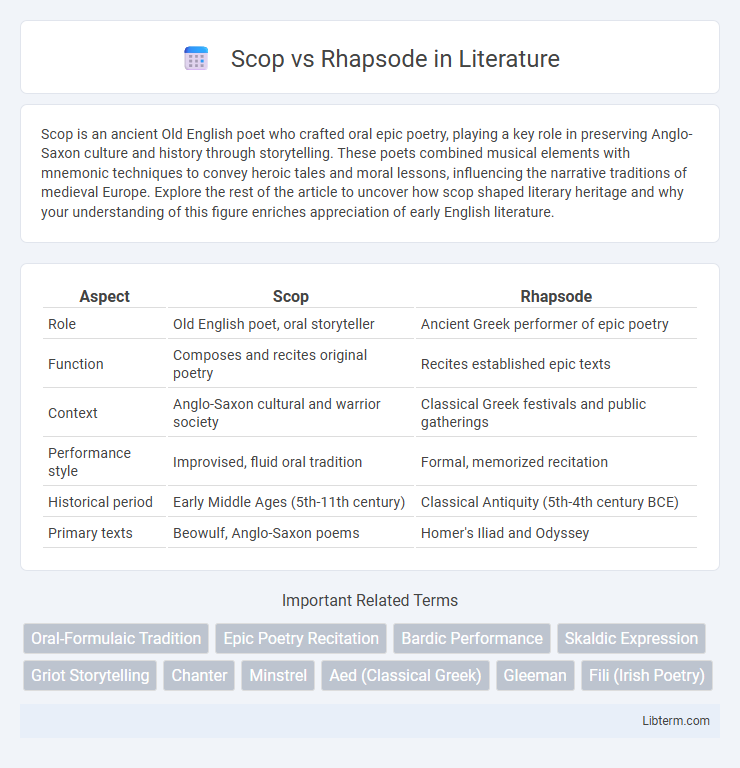Scop is an ancient Old English poet who crafted oral epic poetry, playing a key role in preserving Anglo-Saxon culture and history through storytelling. These poets combined musical elements with mnemonic techniques to convey heroic tales and moral lessons, influencing the narrative traditions of medieval Europe. Explore the rest of the article to uncover how scop shaped literary heritage and why your understanding of this figure enriches appreciation of early English literature.
Table of Comparison
| Aspect | Scop | Rhapsode |
|---|---|---|
| Role | Old English poet, oral storyteller | Ancient Greek performer of epic poetry |
| Function | Composes and recites original poetry | Recites established epic texts |
| Context | Anglo-Saxon cultural and warrior society | Classical Greek festivals and public gatherings |
| Performance style | Improvised, fluid oral tradition | Formal, memorized recitation |
| Historical period | Early Middle Ages (5th-11th century) | Classical Antiquity (5th-4th century BCE) |
| Primary texts | Beowulf, Anglo-Saxon poems | Homer's Iliad and Odyssey |
Introduction to Scops and Rhapsodes
Scops and rhapsodes were pivotal figures in ancient Greek oral tradition, each specializing in different forms of poetic performance. Scops primarily functioned as storytellers and poets who improvised narratives to entertain and educate, often accompanied by music or lyrical recitations. Rhapsodes, on the other hand, were professional performers who memorized and recited epic poetry, such as Homeric epics, preserving and transmitting these works through formal and structured presentations.
Origins and Historical Context
Scops originated as early medieval Anglo-Saxon minstrels known for composing and performing original poetry, often accompanied by the lyre in royal courts. Rhapsodes emerged from ancient Greece as professional reciters specializing in the oral delivery of Homeric epics, preserving and transmitting cultural heritage during the Archaic and Classical periods. Both roles were integral to their societies' storytelling traditions but differed in their functions: scops as creators and entertainers, rhapsodes as preservers and performers of established narratives.
Role in Oral Tradition
Scops were Old English poets who composed and performed original epic and heroic narratives, serving as cultural historians and entertainers in Anglo-Saxon society. Rhapsodes, in ancient Greek tradition, performed established epic poetry like Homer's works, preserving and transmitting canonical texts through recitation. Both roles were vital in oral tradition, with scops fostering creativity and social cohesion, while rhapsodes maintained textual continuity and communal memory.
Functions in Society
Scops served as oral historians, preserving genealogies and cultural narratives through song, reinforcing communal identity in Anglo-Saxon society. Rhapsodes functioned as performers and transmitters of epic poetry in ancient Greece, shaping public memory and educating citizens on heroic values. Both roles were essential for cultural continuity, using performance to embed shared knowledge and societal norms within their communities.
Performance Techniques
Scops employed oral storytelling techniques characterized by melodic vocal modulation and rhythmic phrasing to enhance audience engagement, often incorporating lyrical elements and mnemonic devices. Rhapsodes focused on dramatic recitation with deliberate intonation and physical gestures to convey narrative intensity and emotional depth, frequently performing fixed poetic texts like Homeric epics. Both utilized performance techniques such as repetition and formulaic expressions to aid memorization and deliver compelling live renditions.
Language and Poetic Style
The scop employed alliterative verse characterized by formulaic expressions and oral composition techniques, which reinforced memory and audience engagement through repetitive patterns typical of Old English poetry. The rhapsode utilized a more flexible rhythmic structure and incorporated elaborate rhetorical devices, reflecting the Greek tradition of improvisational storytelling and intricate meter. Both figures preserved cultural narratives, but the scop's style emphasized mnemonic oral transmission while the rhapsode's language showcased sophisticated poetic artistry and variation.
Notable Works and Contributions
Scops, early medieval Gaelic poets, were known for their preservation of oral tradition through storytelling and song, contributing significantly to the cultural memory of their communities with works like heroic ballads and genealogical praise poems. Rhapsodes, ancient Greek performers, specialized in reciting epic poetry such as Homer's Iliad and Odyssey, playing a crucial role in disseminating and preserving these foundational texts of Greek literature. Both the Scop and Rhapsode served as vital cultural transmitters, embedding historical and mythological narratives into their societies through performative artistry.
Cultural Significance
Scops and rhapsodes hold distinct cultural significance in ancient societies, with scops serving as itinerant poets central to Anglo-Saxon oral tradition, preserving history and genealogy through poetic storytelling. Rhapsodes were professional performers in ancient Greece who specialized in reciting epic poetry, such as Homer's works, playing a key role in maintaining and disseminating cultural heritage and collective memory. Both figures exemplify the oral transmission of literature crucial to their respective cultures' identity and continuity.
Comparisons and Contrasts
The Scop and Rhapsode were both traditional Anglo-Saxon oral poets, but the Scop primarily composed original poetry while the Rhapsode specialized in performing and reciting established epic tales. Scops often played a role in creating and preserving their community's cultural identity through innovative storytelling, whereas Rhapsodes focused on memorization and accurate delivery of existing narratives like Homeric epics. The use of musical accompaniment, such as the harp by Scops, contrasted with the Rhapsode's emphasis on spoken recital without instrumental support.
Legacy and Modern Relevance
The Scop, an Old English poet and bard, preserved cultural heritage through oral traditions, influencing medieval literature and folklore studies. Rhapsodes, Ancient Greek reciters of epic poetry like Homer's works, contributed to the transmission of classical myths and laid foundations for Western literary canon. Both roles highlight the enduring significance of oral storytelling in shaping modern narrative art forms and cultural identity.
Scop Infographic

 libterm.com
libterm.com